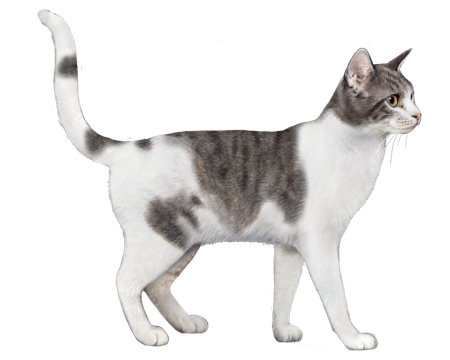
Lebanese Street Cat
Lebanese street cats share the same basic physical characteristics as pet cats, but they live a mostly independent life outdoors.
Interested in discovering if your cat is a Lebanese Street Cat?
Check out Wisdom Panel's DNA test.
Lebanese Street Cat Traits
General Appearance
Lebanese street cats come in all shapes and sizes. Signs of a life-long street cat—versus a stray cat who may be lost—include a well-kept coat (thanks to their meticulous self-grooming), protective body language, and lack of eye contact. Because they are intact, male street cats may have thick necks, muscular bodies, and scars from fighting.
Coat and Colouring
Lebanese street cats' coats can come in all colors, patterns, and lengths.
Distinctive Physical Traits
Lebanese street cats do not follow a breed standard. So, any combination of features is possible.
Lebanese Street Cat Temperament
Street cats often live in groups and congregate near food sources and shelter. Some cats are fearful of being handled or confined by humans. But others may adapt to interactions with people and learn to live indoors.
Lebanese Street Cat History
Like all domestic cats, Lebanese street cats can trace their roots back to the African Wildcat—whose native land stretched from Egypt to Iraq, Syria, Lebanon, and Turkey.
As civilizations developed, cats became helpful partners in pest control. And it wasn't long before they endeared themselves to humans for more than their mousing skills. But the selective breeding that led to purebred cats didn't get underway until the 19th century. Before that, cats were (and mostly still are) non-pedigreed.
Though many people adopt Lebanese street cats as pets, millions live as feral cats fending for themselves in small towns and busy cities. They're particularly rampant in Beirut.
In the 1970s and 1980s, many city dwellers left their cats behind when fleeing the civil war. And over the last several decades, the number of feral cats in the area has exploded.
Lebanese Street Cat Care
Nutrition
A Lebanese street cat's diet typically consists of whatever they can find—scraps from trash cans, birds and rodents, handouts from kind strangers, and so on. If you're leaving food out for a street cat, they will benefit from the same commercially prepared diets as pet cats.
Grooming
Street cats are typically effective self-groomers that keep their coats relatively clean. If you've taken in a street cat that will tolerate it, regular brushing and nail trims will help keep them in tip-top shape.
Health
Lebanese street cats are susceptible to the same diseases as pet cats—including rabies, distemper, feline immunodeficiency virus, and feline leukemia. They are also at risk for numerous internal and external parasites and health issues associated with poor nutrition.
Breed Group
Free-roaming
While sharing similar characteristics with domestic pet cats, Free-Roaming cats are a genetically diverse group which are adapted to spending an independent life outdoors with little to no reliance on humans for their needs.
Resources
https://www.smithsonianmag.com/science-nature/how-cats-conquered-world-180963749/
https://www.the961.com/beirut-new-cat-capital-of-middle-east/
https://www.alleycat.org/resources/feral-and-stray-cats-an-important-difference/
https://icatcare.org/unowned-cats/the-different-needs-of-domestic-cats/
https://www.knowyourcat.info/lib/feralcats.htm
https://www.humanesociety.org/sites/default/files/docs/caring-community-cats-overview.pdf
Reviewed 23 February 2021 by Annette Louviere, DVM







